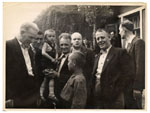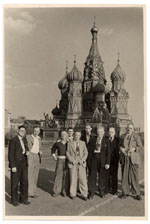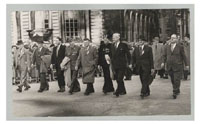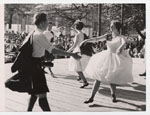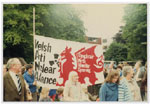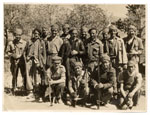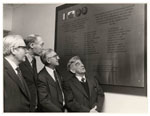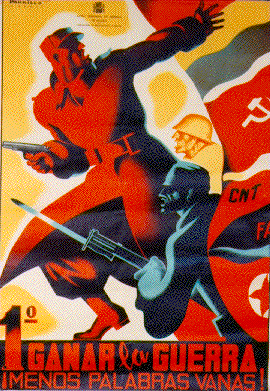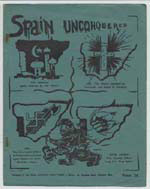 |
| You are here: Cwm > Themes > Love and hate > : International Unity | |
 | |
|
International Unity |
|
|
|
|
|
Delegations | Miners' Galas | Spanish Civil War The South Wales Coalfield was a place of great political activity and of comradeship and support for the International working classes. The Colliers voiced their opinions and both physically and financially supported numerous International causes such as the anti-aparthite movement, wars and miners in other countries that worked in even harsher conditions than those faced in Britain. Evidence of this concern for their fellow man and shared solidarity can be found in delegation visits to a variety of countries, Miners` Galas and a hatred of fascism that saw 134 Welshmen join the International Brigade and fight in the Spanish Civil War.
|
|
|
Delegations.
The miners of South Wales were keen to establish and maintain links of friendship and cooperation with mining communities abroad. This spirit of socialist unity can be seen in the miners’ delegations which visited among other countries, the German Democratic Republic, Hungary, China, France, Czechoslovakia and the Soviet Union. The delegates would visit the coalfield areas, experience the working and social lives of the hosts and foster working class understanding and comradeship extending across national boundaries. In return, delegations of miners from abroad would visit the coal producing areas of South Wales ,
resulting in a working class political and cultural exchange. The following photographs are of a NUM (South Wales Area) Delegation to Russia.
|
|
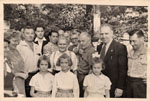
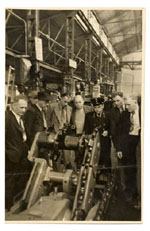
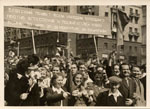
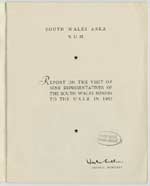
|
|
|
Miners`
Galas.
The slogans and images which appear on the banners of the South Wales miners reveal a strong commitment to world peace, racial equality, thebrotherhood of man, and international working class solidarity everything that the miners’ gala stood for.
The photographs show some of the sights that would be seen at a Miners`Gala day.
|
|
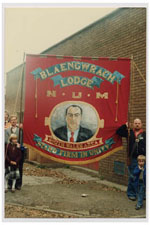
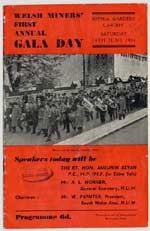
|
|
|
Spanish Civil War. On 18 July 1936, the commander of the Spanish Army based in Morocco, General Francisco Franco, issued a proclamation setting up an alternative government to the official Republican government in Madrid. This action led directly to the outbreak of a civil war in Spain that would last until the beginning of 1939. Many in Europe felt strongly enough to go to Spain and fight, as they saw it, for freedom and democracy against fascism and in defence of the Republic. This combination of intellectuals, industrial workers and political activists 40,000 in all left their jobs and families, and made their way to Spain from all over Europe to be recruited into battalions of what became known as the International Brigade. In Wales, 174 men volunteered for the International Brigade, most of them (118) from the mining valleys of South Wales. Thirty-three of those who volunteered lost their lives. A memorial to them can be found in the South Wales Miners` Library. Back in Wales support for the cause came from the communities in the form of food collections, collections of money at Lodge meetings, fundraising film shows and flag days. South Wales also welcomed some of the 4000 Basque children, refugees whose If you would like to listen to individuals talking about their experiences in Spain and the impact on the families left in Wales then visit the South Wales Miners` Library and listen to the audio collection held there. There are also a number of books, pamphlets and copies of 'Volunteer for Liberty'
held there. |
|
|
Listen to some audio/video material relating to Spanish refugees, Spanish civil war and the Basque children who came to Wales
|
|
|
Sources: Francis, Hywel, Miners Against Fascism. Wales and the Spanish Civil War. (London, 1984)
|
|
Swansea University Special Collections
| ©University of Wales Swansea 2002 |





